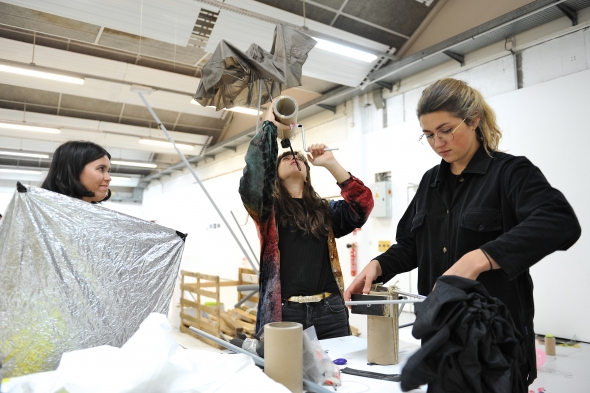
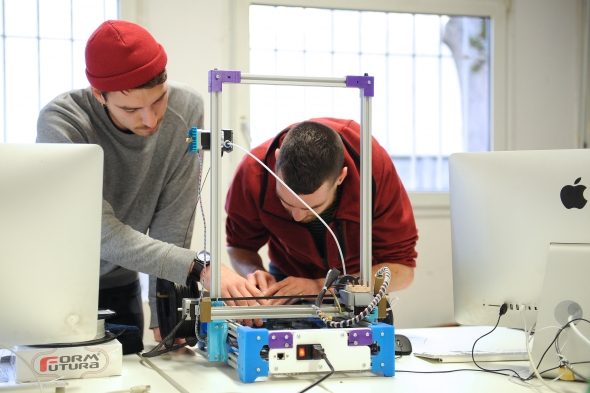
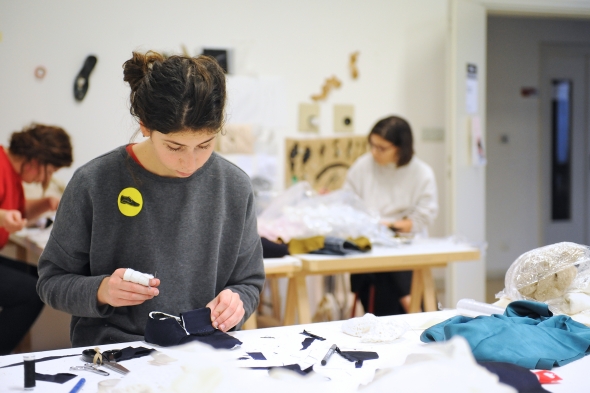
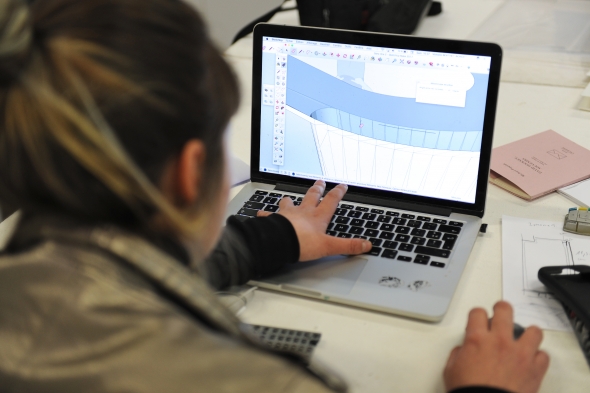
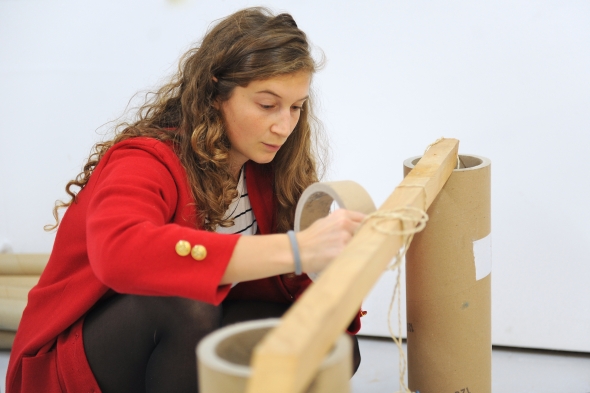
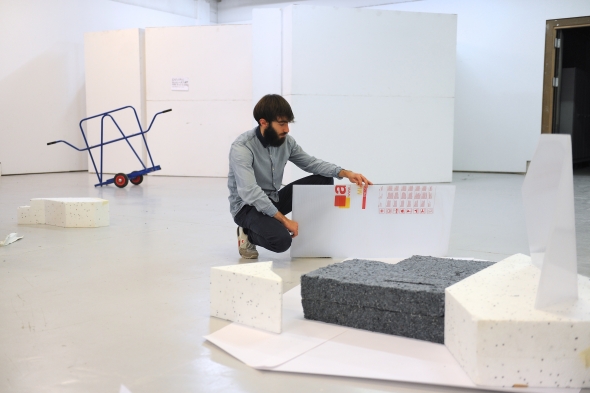
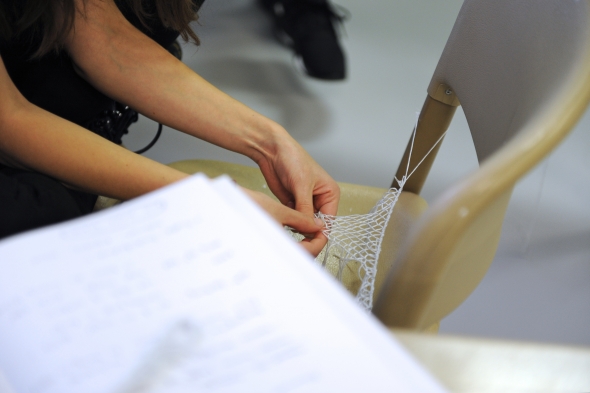
La Haute école des arts du Rhin accueille, du 3 au 5 novembre à Mulhouse, le workshop trinational Design Rhin Supérieur à destination des étudiants en master design en France, Suisse et Allemagne. Cette deuxième édition du workshop accueillera 7 écoles et 70 étudiants des trois pays.
Cette rencontre cherche à réunir un maximum d’école et des étudiants de niveaux master 1 et 2, pour partager leurs sujets, leurs travaux, leurs interrogations et envies de collaboration et découvrir les enseignements en design pratiqués dans les trois pays. Croisant les thèmes de recherche, les méthodes et les pratiques, l’enjeu de cette rencontre est d’engager une dynamique pour que se cristallisent des collaborations fertiles entre disciplines du champ du design.
École participantes : Hochschule der Bildenden Künste Saar (Allemagne), HGK / Fachhochschule Nordwestschweiz FHNW – Hochschule für Gestaltung und Kunst Basel – (Suisse), Hochschule Luzern (Suisse), ENSAD / École nationale supérieure d’art et de design de Nancy, ÉSAL / École supérieure d’art de Lorraine, HEAR / Haute école des arts du Rhin à Strasbourg et Mulhouse et université de Strasbourg.
Le thème général de cette année « Make and manufacture ».
Ce thème très large pose le débat de la fabrication, réalisation et de la mise en œuvre des objets dans notre monde mondialisé et numérique. La chaîne de conception – production numérique reconfigure le geste, la matière, le temps, la forme, mais surtout réinvente le réel et le fictionnel (ou virtuel). « Make and manufacture » est une traduction littérale de la notion du « faire et fabriquer » qui se pose au processus numérique qui veut produire manuellement ou mécaniquement et en série ou à l’unité.
Les workshops seront des moments d’échanges et d’expérimentation autour des questions « du faire et de la production ». L’ensemble du week-end se déroulera en anglais pour faciliter les échanges. Les trois journées s’articulent autour de présentations des écoles et de projets de diplôme des étudiants (niveau master) et d’une série de workshops intensifs dont les sujets seront proposés et dirigés par les enseignants des écoles participantes :
- L’e.rtisan -a craftsman of the digital world
The aim of this workshop is to create a platform for exchange between e.rtisans by publishing a website online. The participants will consider the e.rtisan activity and the production of its first range of objects that will be sold on this website. The first collection of objects on the site of e.rtisan will be on the theme of tools in tribute to the complaint of progress and will decline an ‘atomixer’, a ‘tourniquette’, a waffle gun, a slug iron, an ice stool, a ‘ratatine ordure’…
Teacher : Nathalia Moutinho
- Shoes made from Shoes
Create new shoes from second-hand shoes – and second-hand fabrics and materials. The students will only have access to needles, thread, pins, tape, staplers and textiles glue to redesign their own new shoes. In this workshop, the students will experience how time-consuming it is to make your own creations without using any machines. I want to create awareness of the products which we buy every season, over and over again.
Teacher : Mijiam Spoolder
- NOT THE MACHINE DOES IT – WE MAKE THE MACHINE
In the workshop, machines are developed and built – the drive can be based on gravity, or with wind, tension, centrifugal force, etc. The machine can produce something, transport something, play or enchant. We experiment, explore possibilities, discuss and make decisions. Our workshop is literally analogous.
For three days it is all about tactile experiences, about materials with their specific properties, about weight and lightness, about energy in different kinds and dosages. It is about processes and the
traceability of processes. At the end there should be a jointly developed work, a machine that we want to show the others.
Teachers : Valerie Notter de Rabanal and Heinz Wagner
- Data object / object data
Due to the digitalisation of the design and production process and their combination it has never been easier for a designer to become a producer as well as for producer to design. We want to go even deeper in this workshop. Through the consideration of material objects/object classes and their digital counterparts a determined interdisciplinary understanding of the digital object and its reference to reality should be created..
Teachers : Hannes Käfer and Henrik Elburn
- 3,5 D or how to make a semi-finished product with a 3D (three-dimensional) printer?
This workshop experiments – the manufacture of a semi-finished product, by creating patterns and textures with different flexibility which can generate several remodelings or assemblies.
It requires to use illustrator and IceSL a procedural modeler developed by INRIA.This workshop is organised as follows: – between drawing and production, the reduction of intermediaries, for a speed of production…
Teachers : Alexandre Brugnoni, Pierre-Alexandre Hudron and Béatrice Selleron
- rosa rosam rosae
Dollfus-Mieg et Compagnie (DMC) is a textile company founded in Mulhouse in 1746. It was one of the largest textile and industrial groups in Europe in the 20th century. In the 1990’s, it lost 95% of its workforce. At the beginning of the 21st century, DMC is changing its logo and owner. DMC is now focusing on luxury textiles.
From DMC’s archives and from the book ‘Encyclopedia of Women’s Works’ by Thérèse de Dillmont, you have to work on the idea of ‘make and manufacture’ from a historical, economic and social perspective. Through DMC’s history, the participants have to create a piece about what has been, what is and what the manufacturer can be. The proposal can be didactic, poetic, visual, typographical, moving…
Teacher : Elamine Maecha
- STANDARD / CUSTOM, Demonstrate that design in its methodology can create value from a trivial element
Demonstrate that design in its methodology can create value from a trivial element. How to illustrate a designer approach by upgrading simple and standard products? It is proposed that participants improve or optimise cardboard tubes by assigning them new functions. They can use 3D printing, cut-outs, addition of new products or goods… on these tubes in order to give them a new unexpected, surprising and innovative destination.
Any type of project is welcome: object, micro-architecture, installation… The important thing in a designer’s approach is not essentially the final product, but the whole process and history that led to its completion: document, compilation, film. It is the foundation that will legitimise the existence of their project.
Teacher : Tamim Daoudi
Télécharger le programme du workshop L'album photo complet sur Flickr
(mis en ligne le 27. 10. 2017)